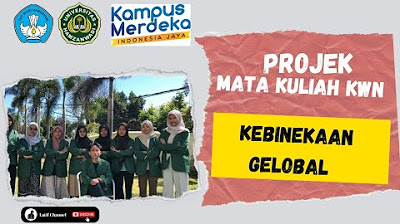Toleransi Islam Dan Keristen di Alor NTT - iNews Pagi 08/06
Summary
TLDRIn the village of Wolwal, Alor, East Nusa Tenggara, religious tolerance shines through during Ramadan. The community, where both Muslim and Christian families coexist, exemplifies unity as Christian neighbors bring food to their Muslim counterparts for Iftar. This harmonious relationship stems from shared roots in the Abui ethnic group, with both faiths respecting each other’s traditions. Despite the quiet start of Ramadan in the village, the spirit of togetherness and respect for different beliefs continues to thrive, preserving a legacy of tolerance passed down by earlier generations.
Takeaways
- 😀 Religious tolerance is a core value in the village of Wolwal, East Nusa Tenggara.
- 😀 The village is home to both Muslim and Christian residents who live together harmoniously.
- 😀 During Ramadan, Christian families prepare meals for their Muslim neighbors to break their fast.
- 😀 This tradition of sharing meals during Ramadan highlights the spirit of mutual respect and unity.
- 😀 The village has a unique cultural history, with residents originally belonging to the Abui ethnic group.
- 😀 The Abui people moved from the mountains to the coastal area, maintaining their distinct faiths while living together.
- 😀 Despite religious differences, the villagers share a common sense of brotherhood and unity.
- 😀 The mutual respect between the two faiths is passed down through generations, promoting continued coexistence.
- 😀 The community’s practice of preparing food for others fosters a deep sense of solidarity.
- 😀 The values of religious tolerance and unity are emphasized as essential lessons for future generations.
Q & A
What is the main focus of the script?
-The script highlights the celebration of Ramadan in a village in Alor, East Nusa Tenggara, and how religious tolerance is demonstrated by the villagers, especially between Christians and Muslims.
How do the villagers of Wolwal demonstrate religious tolerance?
-The villagers show religious tolerance by preparing food for their Muslim relatives during Ramadan and sharing the iftar meal together, despite their different religious backgrounds.
What is the significance of the village of Wolwal in the context of the script?
-Wolwal is significant because it is a village where both Christian and Muslim communities live together harmoniously, maintaining strong religious tolerance and mutual respect.
How do the religious groups in Wolwal interact during Ramadan?
-During Ramadan, the Christian residents prepare food for their Muslim neighbors who are fasting, and they share the meal at iftar, showing respect and solidarity.
What is the cultural and historical background of the people in Wolwal?
-The people in Wolwal originally belong to the Abui ethnic group from the Mataro mountains, who later moved to the coastal areas, with some members embracing Islam while others remained Christian.
What is the unique feature of the village in terms of religious practices?
-A unique feature of the village is that it has both Christian and Muslim residents living in close proximity, with both groups maintaining their respective places of worship.
What role do the elders play in fostering religious tolerance in the village?
-The elders of the village laid the foundation for religious tolerance by encouraging unity and mutual respect, which has been passed down to younger generations.
How does the village's approach to religious tolerance impact future generations?
-The village's approach ensures that future generations will continue to uphold the values of unity and tolerance, preserving the harmonious relationship between different religious groups.
What does the preparation and sharing of food during Ramadan symbolize in the village?
-The preparation and sharing of food symbolize the strong bonds of family and community, transcending religious differences and reinforcing mutual respect and understanding.
Why is the village of Wolwal considered an example of interfaith harmony?
-Wolwal is considered an example of interfaith harmony because it demonstrates how people of different faiths can live together peacefully, celebrate each other's religious practices, and foster a sense of unity.
Outlines

This section is available to paid users only. Please upgrade to access this part.
Upgrade NowMindmap

This section is available to paid users only. Please upgrade to access this part.
Upgrade NowKeywords

This section is available to paid users only. Please upgrade to access this part.
Upgrade NowHighlights

This section is available to paid users only. Please upgrade to access this part.
Upgrade NowTranscripts

This section is available to paid users only. Please upgrade to access this part.
Upgrade NowBrowse More Related Video

Wujud Harmoni Keberagaman | @RefleksiDAAITV

Mata Kuliah Kewarganegaraan berbasis Projek..(MKWK) #universitashamzanwadi #mkwk #budaya

ADWI 2024 || Desa Wisata Tiworiwu (Kampung Megalith Bena) Jerebuu, Kabupaten Ngada, NTT

Karya Para Juara Kompetisi Video Pendek "Silaturahmi & Toleransi"

DRAMA INE PARE - BULOG KANWIL NTT

Dijuluki Kampung Miliarder! Desa Mandiri Terkaya di Indonesia, Pendapatan Daerahnya Sangat Fantastis
5.0 / 5 (0 votes)